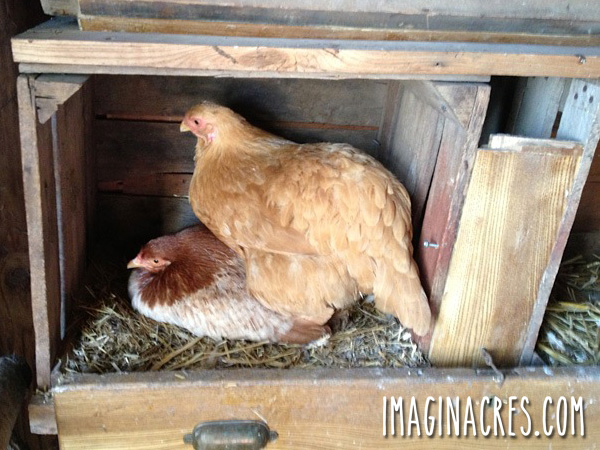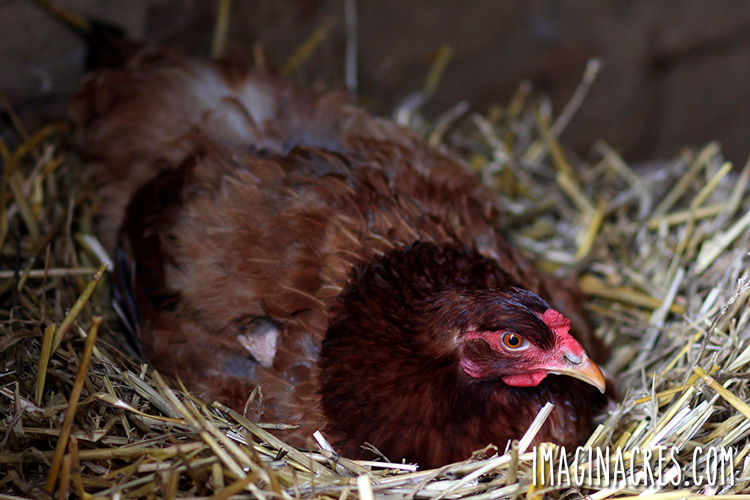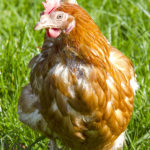A broody hen is one that develops the natural urge to hatch eggs and raise chicks. Here are ways to tell if your chicken is broody and tips to deal with a broody hen.

Two weeks after we started eggs in an incubator, one of our hens started showing signs of broodiness.
Out of our whole flock, this is the one bird that I never, ever, expected to want to be a momma. Can you guess who it is? Is it our Silkie, the most broody breed known to man? Nope. Is it one of our sweet, good-natured Orpingtons, known for their desire to hatch and raise babies? Wrong again.
It’s the fiercest, squawky, crazy bird in our flock…Little Carl. That’s right, Little Carl, our Buff Chantecler is going to be a Mom.
She stubbornly decided three days ago that all the eggs and the nesting box belong to her now. The only problem is, she forgot to inform the rest of the flock. She sits in her box on those eggs all day long, flat as a pancake.
The other birds who like to use that nest box enter the coop everyday and scream and squawk, jumping up and down from the box trying to get her out. When she doesn’t budge they get in anyway. The two birds yell angrily at each other for a few minutes until things quiet down. I went into the coop yesterday to see how they worked out this situation and found this:

This seems an acceptable solution for both birds. They will lay in that nest together until the egg drops, and then the layer takes off. Little Carl tucks the new egg carefully underneath her to join the rest of the developing babies.
What is a broody hen?
A hen is broody when they want to hatch eggs and raise chicks. Broodiness in a hen can come on quickly and without warning. Suddenly, she has a deep determination to sit on eggs and hatch babies. It doesn’t matter if they are her egg or those from other flock mates. It doesn’t even matter if the eggs are fertilized or not.
Why do hens get broody?
What triggers a hen to go broody isn’t completely known, but it is believed to be a combination of natural instinct, hormones, and maturity that triggers a hen to go broody.
If nature had its way, a flock with a rooster will result in fertilized eggs. When a hen becomes broody and wants to raise chicks, she will lay one egg almost daily until she has a clutch of about a dozen eggs. Then she stops laying eggs, and sits on them for about three weeks until the chicks hatch. Since many backyard chicken owners remove the eggs each day, the hens never get the chance to settle into her natural broody rhythm.
Many hens don’t experience broodiness at all, while some are absolutely compelled to attempt hatching eggs to the point of sitting on anything that resembles an egg. Some broody hens are so determined to hatch eggs, they will even resort to stealing eggs from their flock mates, and other poultry such as ducks and geese.
Breeds of chickens that tend to go broody
Most chicken breeds used for egg production have had the broodiness bread out of them using natural selection. Once a chicken goes broody and begins to incubate eggs, they stop laying. So it will be rare for Golden Comet and White Leghorn breeds to go broody.
Breeds most likely to brood include Ameraucana, Aracana, Australorp, Brahma, Buckeye, Chantecler, Cochin, Cornish, Deleware, Dominique, Dorking, Houdan, Java, Jersey Giant, New Hampshire, Orpington, Plymoth Rock, Silkie, and Sussex.
Signs that your hen is broody
The first thing you may notice is your hen may seem grumpy and stop spending time outside with the rest of the flock. Be sure to check her over to make sure she isn’t hurt or sick. Once you are sure she isn’t ill, look for the following signs that she may be broody:
Your hen won’t leave the nest
If your hen is sitting in the nest all day, there is a chance that she is broody. Most hens lay their eggs and leave the nest box to go on with their normal routines of being a chicken. Hens that have gone broody will only leave the nest a few times a day to eat, drink, and poop. They will remain on the nest while the rest of the flock eats, forages, and roosts at night.
The hen becomes aggressive while sitting on the nest
If your hen is very hostile when you reach under her into the nest, chances are she is broody. Broody hens tend to puff out their feathers, growl, and peck at the intrusion. Even the sweetest hen can become very defensive.
Your hen is laying flat in the nest
If your hen is spreading her wings out slightly and nestling her chest deep into the nest, she may be broody. Broody hens flatten themselves out on the nest to provide plenty of heat to hatch a clutch of eggs.

There are bald patches on her chest and belly
If your hen has plucked out breast feathers, she may be broody. A broody hen will often pluck her breast feathers to provide more direct contact with her skin, which helps regulate heat and humidity for the incubating eggs. The plucked feathers also help insulate the nest to help keep heat in.
Ways to deal with a broody hen
So what do you do if your hen is broody? You’ll need to decide if you want to break her of broodiness or let her try to hatch and raise chicks.
Break your hen’s broodiness
Being broody takes a lot out of a hen. The urge to stay on the nest day and night is strong, and it may be difficult getting her to eat and drink normally. If you allow your hen to continue her broodiness even if there are no fertile eggs, it may have an effect on her health.
If you want your hen to stop being broody, you have several things you can try:
Remove the eggs: First, remove all the eggs from the nest. Wear gloves and long sleeves to protect you from bites. Your hen will do all she can to protect what she thinks are her babies.
Place the broody hen outside: Remove the hen from the nest and place her in the pen with the rest of the flock. It is helpful to toss some enticing treat to the flock to distract her. Sometimes this is enough to snap her out of it.
Your hen may be persistent and return to the nest every time you try to remove her. Try closing off the nesting boxes so she cannot return.
Put the broody hen on the roost at night: Wait until after dark and all the hens are roosting for the night. Remove the hen from the nest and place her on a roost. Since chickens can’t see at night, there is a good chance she will remain on the roost to sleep. Hopefully by morning, she will forget that she wanted to hatch chicks.
Usually, the above methods do the trick. If your hen is stubborn and continues to insist on being broody, there are other things you can try. Part of what triggers a hen to go broody is a surge of hormones that elevate her temperature so she can incubate eggs. Cooling the hen may help alter her instinct to sit on eggs. Some suggest placing a few ice cubes under the hen or put a frozen water bottle in the nest.
Let a broody hen hatch eggs and raise chicks
If you want to raise chicks then having a broody hen is helpful. You can give a broody hen fertilized eggs to hatch or even trick your broody hen to accept store bought chicks.
- Pros and Cons of Hatching Eggs with an Incubator vs. Broody Hen
- How to Introduce Chicks to a Broody Hen

Even though we had an incubator full of eggs, we decided to let Little Carl stay broody and hatch her clutch of eggs.
I’m in awe of Little Carl’s devotion to these eggs. She only gets off the nest once or twice a day to get some food or water then gets straight back to it. She sits all day in a zen-like calm, cooing to herself and her tiny embryos. The changes in her behavior are amazing.
It’s truly beautiful to witness a creature on the path to motherhood. She’s no longer the rambunctious little monster she used to be. She lets me pet her every day and allows me to check on the eggs underneath her. She’s a sweet little momma-to-be. It’s only a matter of time before her sweetness turns back to insanity as she defends her new brood from the rest of the flock.
Related Posts





you are going to have a TON of cute baby chicks chirping about!! Next time I am over for eggs, I have to see them in person!
Absolutely! They will be so cute!!
I completely agree about watching the beauty of motherhood. When my crazy Sylvia decided to be a mama, her whole personality changed. It was very sweet to watch her devotion.
I am just starting to witness one of my California whites go broody. I never imagined it and she is starting to display all signs but pecking. I’m tempted to let her run her course and see what happens when an Ancona gets mixed with hers and an ISA brown. I’m pretty sure she is sitting on one because my Bessie lays hers super early in the morning.